- Home
- Stephen Hunter
Citadel Page 2
Citadel Read online
Page 2
“This is not turning out at all as I had expected.”
“I’ll buzz up to a thousand. Sir, the trick here is that when you come out of the plane, you must keep hunched up in a ball. If you open up, your arms and legs and torso will catch wind and stall your fall and the tail wing will cut you in half or at least break your spine.”
“Egad,” said Basil. “How disturbing.”
“I’ll bank hard left to add gravity to your speed of descent, which puts you in good shape, at least theoretically, to avoid the tail.”
“Not sure I care for ‘theoretically.’” “There’s no automatic deployment on that device, also. You must, once free of the plane, pull the ripcord to open the ’chute.”
“I shall try to remember,” said Basil.
“If you forget, it’s the pumpkin phenomenon, without doubt.”
“All right, Murphy, you’ve done a fine job briefing me. I shall have a letter inserted in your file. Now, shall we get this nonsense over with?”
“Yes, sir. You’ll feel the plane bank, you should have no difficulty with the door, remember to take off earphones and throat mike, and I’ll signal go. Just tumble out. Rip cord, and down you go. Don’t brace hard in landing—you could break or sprain something. Try to relax. It’s a piece of cake.”
“Very well done, Murphy.”
“Sir, what should I tell them?”
“Tell them what happened. That’s all. I’ll happily be the villain. Once I potted the compass, it was either do as I say or head home. On top of that, I outrank you. They’ll figure it out, and if they don’t, then they’re too damned stupid to worry about!”
“Yes, sir.”
Basil felt the subtle, then stronger pull of gravity as Murphy pulled the stick back and the plane mounted toward heaven. He had to give more throttle, so the sound of the revs and the consequent vibrations through the plane’s skeleton increased. Basil unhitched the door, pushed it out a bit, but then the prop wash caught it and slammed it back. He opened it a bit again, squirmed his way to the opening, scrunched to fit through, brought himself to the last point where he could be said to be inside the airplane, and waited.
Below, the blackness roared by, lit here and there by a light. It really made no difference where he jumped. It would be completely random. He might come down in a town square, a haystack, a cemetery, a barn roof, or an SS firing range. God would decide, not Basil.
Murphy raised his hand, and probably screamed “Tally-ho!”
Basil slipped off the earphones and mike and tumbled into the roaring darkness.
A few days earlier (cont’d.)
“Certainly,” said Basil, “though I doubt I’ll be allowed to make the trip. The path to Jesus would include sobriety, a clean mind, obedience to all commandments, a positive outlook, respect for elders, regular worship, and a high level of hygiene. I am happily guilty of none of those.”
“The damned insouciance,” said the army general. “Is everything an opportunity for irony, Captain?”
“I shall endeavor to control my ironic impulses, sir,” said Basil.
“Actually, he’s quite amusing,” said the young civilian. “A heroic chap as imagined by Noël Coward.”
“Coward’s a poof, Professor.”
“But a titanic wit.”
“Gentlemen, gentlemen,” said Sir Colin. “Please, let’s stay with the objective here, no matter how Captain St. Florian’s insouciance annoys or enchants us.”
“Then, sir,” said Basil, “the irony-free answer is no, I do not know the path to Jesus.”
“I don’t mean in general terms. I mean specifically The Path to Jesus, a pamphlet published in 1767 by a Scottish ecclesiastic named Thomas MacBurney. Actually he listed twelve steps on the way, and I believe you scored high on your account, Basil. You only left out thrift, daily prayer, cold baths, and regular enemas.”
“What about wanking, sir? Is that allowed by the Reverend MacBurney?”
“I doubt he’d heard of it. Anyway, it is not the content of the reverend’s pamphlet that here concerns us but the manuscript itself. That is the thing, the paper on which he wrote in ink, the actual physical object.” He paused, taking a breath. “The piece began as a sermon, delivered to his congregation in that same year. It was quite successful—people talked much about it and requested that he deliver it over and over. He did, and became, one might say, an ecclesiastical celebrity. Then it occurred to him that he could spread the Word more effectively, and make a quid or two on the side— he was a Scot, after all—if he committed it to print and offered it for a shilling a throw. Thus he made a fair copy, which he delivered to a jobbing printer in Glasgow, and took copies around to all the churches and bookstores. Again, it was quite successful. It grew and grew and in the end he became rather prosperous, so much so that—this is my favorite part of the tale—he gave up the pulpit and retired to the country for a life of debauchery and gout, while continuing to turn out religious tracts when not abed with a local tart or two.”
“I commend him,” said Basil.
“As do we all,” said the admiral.
“The fair copy, in his own hand, somehow came to rest in the rare books collection at the Cambridge Library. That is the one he copied himself from his own notes on the sermon, and which he hand-delivered to Carmichael & Sons, printers, of 14 Middlesex Lane, Glasgow, for careful reproduction on September 1, 1767. Mr. Carmichael’s signature in receipt, plus instructions to his son, the actual printer, are inscribed in pencil across the title page. As it is the original, it is of course absurdly rare, which makes it absurdly valuable. Its homilies and simple faith have nothing to do with it, only its rarity, which is why the librarian at Cambridge treasures it so raptly. Are you with me, Basil?”
“With you, sir, but not with you. I cannot begin to fathom why this should interest the intelligence service, much less the tiny cog of it known as Basil St. Florian. Do you think exposure to it would improve my moral character? My character definitely needs moral improvement, but I should think any book of the New Testament would do the job as well as the Reverend MacBurney.”
“Well, it happens to be the key to locating a traitor, Basil. Have you ever heard of the book code?”
The Second Day
There was a fallacy prevalent in England that Occupied France was a morose, death-haunted place. It was gray, gray as the German uniforms, and the conquerors goose-stepped about like Mongols, arbitrarily designating French citizens for execution by firing squad as it occurred to them for no reason save whimsy and boredom and Hun depravity. The screams of the tortured pierced the quiet, howling out of the many Gestapo torture cellars. The Horst Wessel song was piped everywhere; swastikas emblazoned on vast red banners fluttered brazenly everywhere. Meanwhile the peasants shuffled about all hangdog, the bourgeoisie were rigid with terror, the civic institutions were in paralysis, and even the streetwalkers had disappeared.
Basil knew this to be untrue. In fact, Occupied France was quite gay. The French barely noted their own conquest before returning to bustling business as usual, or not as usual, for the Germans were a vast new market. Fruit, vegetables, slabs of beef, and other provisions gleamed in every shop window, the wine was ample, even abundant (if overpriced), and the streetwalkers were quite active. Perhaps it would change later in the war, but for now it was rather a swell time. The Resistance, such as it was—and it wasn’t much—was confined to marginal groups: students, Communists, bohemians, professors—people who would have been at odds with society in any event; they just got more credit for it now, all in exchange for blowing up a piddling bridge or dynamiting a rail line which would be repaired in a few hours. Happiness was general all over France.
The source of this gaiety was twofold. The first was the French insistence on being French, no matter how many panzers patrolled the streets and crossroads. Protected by their intensely high selfesteem, they thought naught of the Germans, regarding the feldgrau as a new class of tourist, to be fleeced, condescen
ded to (“Red wine as an aperitif! Mon Dieu!”), and otherwise ignored. And there weren’t nearly as many Nazi swastikas fluttering on silk banners as one might imagine.
The second reason was the immense happiness of the occupiers themselves. The Germans loved the cheese, the meals, the whores, the sights, and all the pleasures of France, it is true, but they enjoyed one thing more: that it was Not Russia.
This sense of Not-Russia made each day a joy. The fact that at any moment they could be sent to Is-Russia haunted them and drove them to new heights of sybaritic release. Each pleasure had a melancholy poignancy in that he who experienced it might shortly be slamming 8.8 cm shells into the breach of an antitank gun as fleets of T-34s poured torrentially out of the snow at them, this drama occurring at minus thirty-one degrees centigrade on the outskirts of a town with an unpronounceable name that they had never heard of and that offered no running water, pretty women, or decent alcohol.
So nobody in all of France in any of the German branches worked very hard, except perhaps the extremists of the SS. But most of the SS was somewhere else, happily murdering farmers in the hundreds of thousands, letting their fury, their rage, their misanthropy, their sense of racial superiority play out in real time.
Thus Basil didn’t fear random interception as he walked the streets of downtown Bricquebec, a small city forty kilometers east of Cherbourg in the heart of the Cotentin Peninsula. The occupiers of this obscure spot would not be of the highest quality, and had adapted rather too quickly to the torpor of garrison life. They lounged this way and that, lazy as dogs in the spring sun, in the cafés, at their very occasional roadblocks, around city hall, where civil administrators now gave orders to the French bureaucrats, who had not made a single adjustment to their presence, and at an airfield where a flock of Me110 night fighters were housed, to intercept the nightly RAF bomber stream when it meandered toward targets in southern Germany. Though American bombers filled the sky by day, the two-engine 110s were not nimble enough to close with them and left that dangerous task to younger men in faster planes. The 110 pilots were content to maneuver close to the Lancasters, but not too close, to hosepipe their cannon shells all over the sky, then to return to schnapps and buns, claiming extravagant kill scores which nobody took seriously. So all in all, the atmosphere was one of snooze and snore.
Basil had landed without incident about eight kilometers outside of town. He was lucky, as he usually was, in that he didn’t crash into a farmer’s henhouse and awaken the rooster or the man but landed in one of the fields, among potato stubs just barely emerging from the ground. He had gathered up his ’chute, stripped off his RAF jumpsuit to reveal himself to be a rather shabby French businessman, and stuffed all that kit into some bushes (he could not bury it, because a] he did not feel like it and b] he had no shovel, but c] if he had had a shovel, he still would not have felt like it). He made it to a main road and walked into town, where he immediately treated himself to a breakfast of eggs and potatoes and tomatoes at a railway station café.
He nodded politely at each German he saw and so far had not excited any attention. His only concession to his trade was his Browning pistol, wedged into the small of his back and so flat it would not print under suit and overcoat. He also had his Riga Minox camera taped to his left ankle. His most profound piece of equipment, however, was his confidence. Going undercover is fraught with tension, but Basil had done it so often that its rigors didn’t drive him to the edge of despair, eating his energy with teeth of dread. He’d simply shut down his imagination and considered himself the cock of the walk, presenting a smile, a nod, a wink to all.
But he was not without goal. Paris lay a half day’s rail ride ahead; the next train left at four, and he had to be on it. But just as he didn’t trust the partisans who still awaited his arrival 320 kilometers to the east, he didn’t trust the documents the forgery geniuses at SOE had provided him with. Instead he preferred to pick up his own—that is, actual authentic docs, including travel permissions— and he now searched for a man who, in the terrible imagery of document photography, might be considered to look enough like him.
It was a pleasant day and he wandered this way and that, more or less sightseeing. At last he encountered a fellow who would pass for him, a welldressed burgher in a black homburg and overcoat, dour and official-looking. But the bone structure was similar, given to prominent cheekbones and a nose that looked like a Norman axe. In fact the fellow could have been a long-lost cousin. (Had he cared to, Basil could have traced the St. Florian line back to a castle not 100 kilometers from where he stood now, whence came his Norman forebears in 1044—but of course it meant nothing to him).
Among Basil’s skills was pickpocketing, very useful for a spy or agent. He had mastered its intricacies during his period among Malaysian gunrunners in 1934, when a kindly old rogue with one eye and fast hands named Malong had taken a liking to him and shown him the basics of the trade. Malong could pick the fuzz off a peach, so educated were his fingers, and Basil proved an apt pupil. He’d never graduated to the peach-fuzz class, but the gentleman’s wallet and document envelopes should prove easy enough.
He used the classic concealed hand dip and distraction technique, child’s play but clearly effective out here in the French hinterlands. Shielding his left hand from view behind a copy of that day’s Le Monde, he engineered an accidental street-corner bump, apologized, and then said, “I was looking at the air power of les amis today.” He pointed upward, where a wave of B-17s painted a swath in the blue sky with their fuzzy white contrails as they sped toward Munich or some other Bavarian destination for an afternoon of destruction. “It seems they’ll never stop building up their fleet. But when they win, what will they do with all those airplanes?”
The gentleman, unaware that the jostle and rhetoric concealed a deft snatch from inside not merely his overcoat but also his suit coat, followed his interrupter’s pointed arm to the aerial array.
“The Americans are so rich, I believe our German visitors are doomed,” said the man. “I only hope when it is time for them to leave they don’t grow bitter and decide to blow things up.”
“That is why it is up to us to ingratiate ourselves with them,” said Basil, reading the eyes of an appeaser in his victim, “so that when they do abandon their vacation, they depart with a gentleman’s deportment. Vive la France.”
“Indeed,” said the mark, issuing a dry little smile of approval, then turning away to his far more important business.
Basil headed two blocks in the opposite direction, two more in another, then rotated around to the train station. There, in the men’s loo, he examined his trove: 175 francs, identity papers for one Jacques Piens, and a German travel authority “for official business only,” both of which wore a smeary black-and-white photo of M. Piens, moustachioed and august and clearly annoyed at the indignity of posing for German photography.
He had a coffee. He waited, smiling at all, and a few minutes before four approached the ticket seller’s window and, after establishing his bona fides as M. Piens, paid for and was issued a firstclass ticket on the four p.m. Cherbourg–Paris run.
He went out on the platform, the only Frenchman among a small group of Luftwaffe enlisted personnel clearly headed to Paris for a weekend pass’s worth of fun and frolic. The train arrived, as the Germans had been sensible enough not to interfere with the workings of the French railway system, the continent’s best. Spewing smoke, the engine lugged its seven cars to the platform and, with great drama of steam, brakes, and steel, reluctantly halted. Basil knew where first class would be and parted company with the privates and corporals of the German air force, who squeezed into the other carriages.
His car half empty and comfortable, he put himself into a seat. The train sat … and sat … and sat. Finally a German policeman entered the car and examined the papers of all, including Basil, without incident. Yet still the train did not leave.
Hmm, this was troubling.
A lesser man might
have fumbled into panic. The mark had noticed his papers missing, called the police, who had called the German police. Quickly enough they had put a hold on the train, fearing that the miscreant would attempt to flee that way, and now it was just a matter of waiting for an SS squad to lock up the last of the Jews before it came for him.
However, Basil had a sound operational principle which now served him well. Most bad things don’t happen. What happens is that in its banal, boring way, reality bumbles along.
The worst thing one can do is panic. Panic betrays more agents than traitors. Panic is the true enemy.
At last the train began to move.
Ah-ha! Right again.
But at that moment the door flew open and a late-arriving Luftwaffe colonel came in. He looked straight at Basil.
“There he is! There’s the spy!” he said.
A few days earlier (cont’d)
“A book code,” said Basil. “I thought that was for Boy Scouts. Lord Baden-Powell would be so pleased.”
“Actually,” said Sir Colin, “it’s a sturdy and almost impenetrable device, very useful under certain circumstances, if artfully employed. But Professor Turing is our expert on codes. Perhaps, Professor, you’d be able to enlighten Captain St. Florian.”
“Indeed,” said the young man in the tweeds, revealing himself by name. “Nowadays we think we’re all scienced up. We even have machines to do some of the backbreaking mathematics to it, speeding the process. Sometimes it works, sometimes it doesn’t. But the book code is ancient, even biblical, and that it has lasted so long is good proof of its applicability in certain instances.”
“I understand, Professor. I am not a child.”
“Not at all, certainly not given your record. But the basics must be known before we can advance to the sort of sophisticated mischief upon which the war may turn.”

 Point of Impact
Point of Impact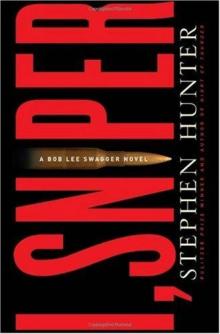 I, Sniper
I, Sniper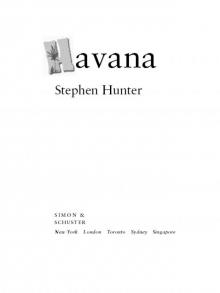 Havana
Havana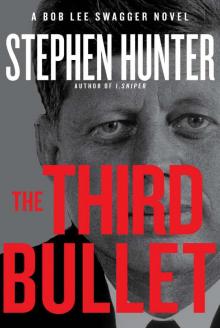 The Third Bullet
The Third Bullet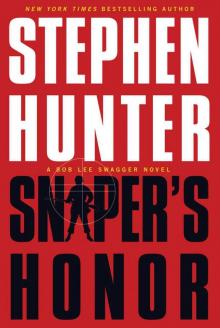 Sniper's Honor: A Bob Lee Swagger Novel
Sniper's Honor: A Bob Lee Swagger Novel Dirty White Boys
Dirty White Boys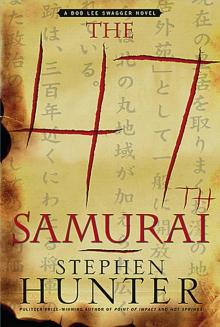 The 47th Samurai
The 47th Samurai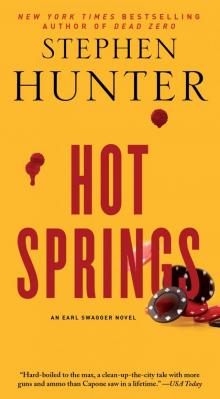 Hot Springs
Hot Springs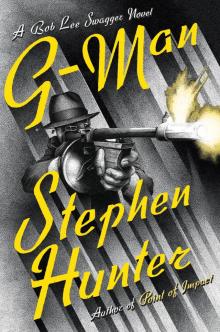 G-Man
G-Man Black Light
Black Light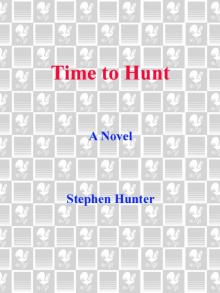 Time to Hunt
Time to Hunt The Day Before Midnight
The Day Before Midnight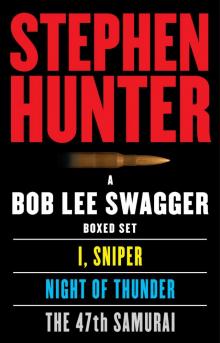 A Bob Lee Swagger Boxed Set
A Bob Lee Swagger Boxed Set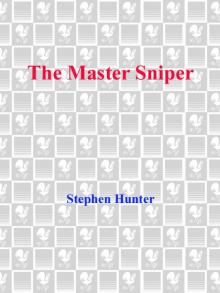 The Master Sniper
The Master Sniper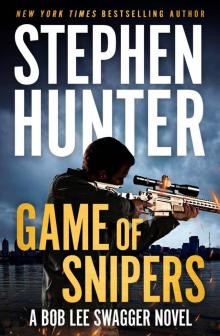 Game of Snipers
Game of Snipers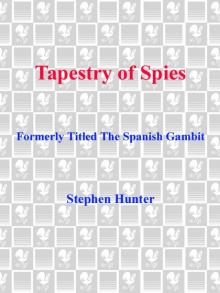 Tapestry of Spies
Tapestry of Spies Citadel
Citadel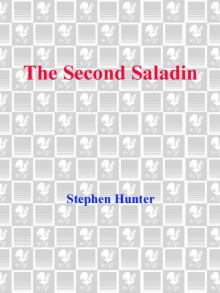 The Second Saladin
The Second Saladin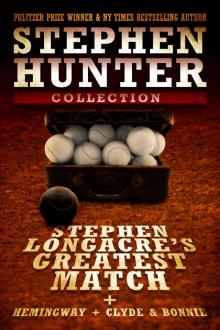 Stephen Longacre's Greatest Match
Stephen Longacre's Greatest Match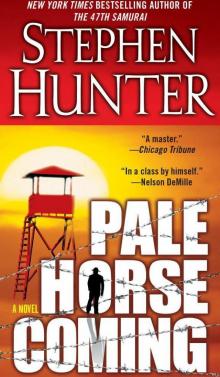 Pale Horse Coming
Pale Horse Coming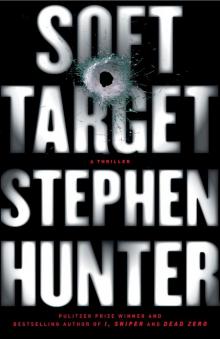 Soft Target
Soft Target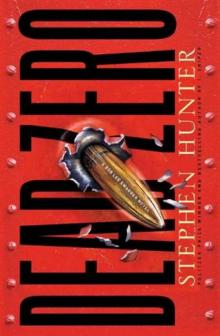 Dead Zero
Dead Zero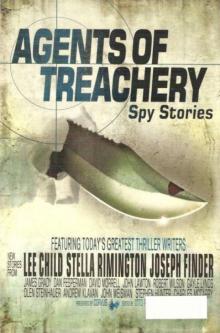 Casey at the Bat
Casey at the Bat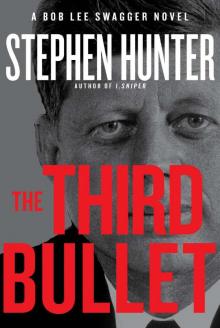 The Third Bullet bls-8
The Third Bullet bls-8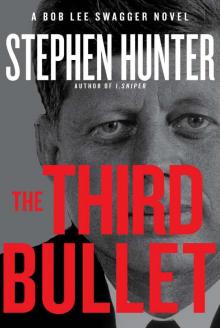 The Third Bullet: A Bob Lee Swagger Novel
The Third Bullet: A Bob Lee Swagger Novel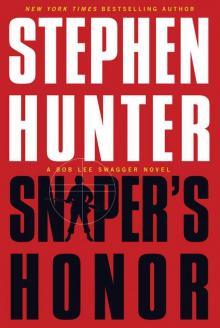 Sniper's Honor
Sniper's Honor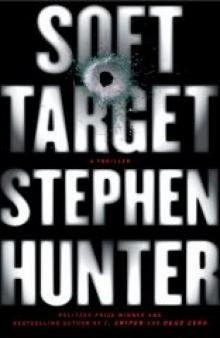 Soft target rc-1
Soft target rc-1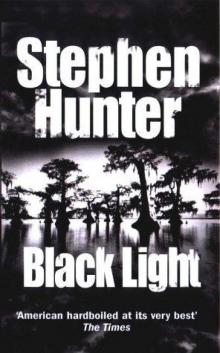 Black Light bls-2
Black Light bls-2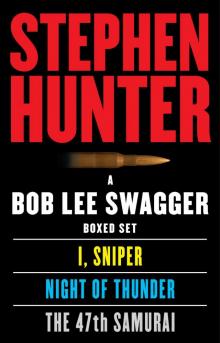 A Bob Lee Swagger eBook Boxed Set: I, Sniper, Night of Thunder, 47th Samurai
A Bob Lee Swagger eBook Boxed Set: I, Sniper, Night of Thunder, 47th Samurai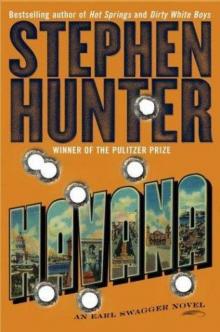 Havana es-3
Havana es-3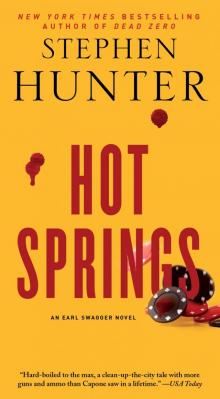 Hot Springs (Earl Swagger)
Hot Springs (Earl Swagger)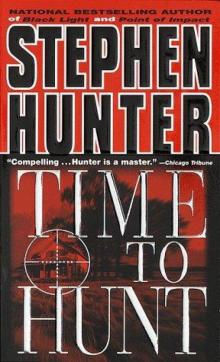 Time to Hunt bls-1
Time to Hunt bls-1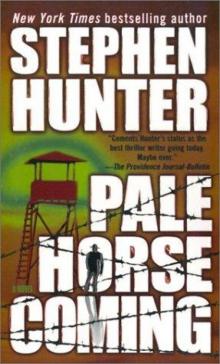 Pale Horse Coming es-2
Pale Horse Coming es-2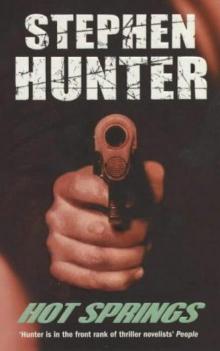 Hot Springs es-1
Hot Springs es-1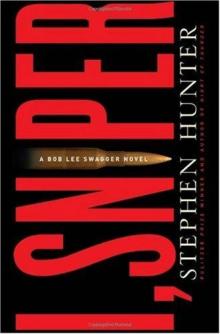 I, Sniper: A Bob Lee Swagger Novel
I, Sniper: A Bob Lee Swagger Novel